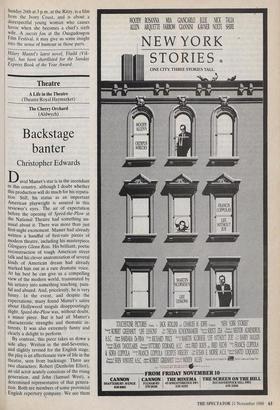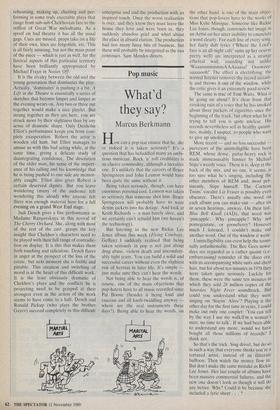Theatre A Life in the Theatre (Theatre Royal Haymarket)
The Cherry Orchard (Aldwych)
Backstage banter
Christopher Edwards David Mamet's star is in the ascendant in this country, although I doubt whether this production will do much for his reputa- tion. Still, his status as an important American playwright is assured in this reviewer's eyes. The air of expectation before the opening of Speed-the-Plow at the National Theatre had something un- usual about it. There was more than just first-night excitement. Mamet had already written a handful of first-rate pieces of modern theatre, including his masterpiece Glengarry Glenn Ross. His brilliant, poetic reconstruction of tough American street talk and his clever anatomisation of several kinds of American dream had already marked him out as a rare dramatic voice. At his best he can give us a compelling view of the modern world, transmuted by his artistry into something touching, pain- ful and absurd. And, pricelessly, he is very funny. In the event, and despite the expectations, many found Mamet's satire about Hollywood moguls disappointingly slight. Speed-the-Plow was, without doubt, a minor piece. But it had all Mamet's characteristic strengths and thematic in- terests. It was also extremely funny and clearly' a delight to perform. By contrast, this piece takes us down a side alley. Written in the mid-Seventies, and slightly revised for the English stage, the play is an affectionate view of life in the theatre, seen from backstage. There are two characters: Robert (Denholm Elliot), an old actor acutely conscious of the rising generation, and John (Samuel West), a determined representative of that genera- tion. Both are members of some provincial English repertory company. We see them
rehearsing, making up, chatting and per- forming in some truly execrable plays that range from sub-sub-Chekhovian fare to the stiffest of Great War melodrama. As a spoof on bad theatre it has all the usual gags. Cues are missed, props take on a life of their own, lines are forgotten, etc. This is all fairly amusing, but not the main point of the piece — which is just as well, for the farcical aspects of this particular territory have been brilliantly appropriated by Michael Frayn in Noises Off.
It is the rivalry between the old and the young generation that dominates the play. Actually, 'dominates' is pushing it a bit. A Life in the Theatre is essentially a series of sketches that become limper and limper as the evening wears on. Any two or three put together would make a nice playlet. But strung together as they are here, you are struck more by their slightness than by any sense of dramatic shape. Only Denholm Elliot's performance keeps you from com- plete exasperation. Robert the actor is wooden old ham, but Elliot manages to amuse us with this bad acting while, at the same time, giving a delicate study of disintegrating confidence. The desolation of the older man, his sense of the import- ance of his calling and his knowledge that he is being pushed to one side are memor- ably caught. Elliot also gives Robert a certain deserved dignity. But you leave wondering (many of the audience left wondering this aloud) why anyone felt there was enough material here for a full evening on a grand West End stage.
Judi Dench gives a fine performance as Madame Ranyevskaya in this revival of The Cherry Orchard. She, along with most of the rest of the cast, grasps the key insight that Chekhov's characters need to be played with their full range of contradic- tion on display. It is this that makes them both touching and ridiculous. Dench flares in anger at the prospect of the loss of the estate, but next moment she is feeble and pitiable. This creation and switching of mood is at the heart of this difficult work. It is the least obviously dramatic of Chekhov's plays and the conflicts he is projecting need to be grasped at their strongest even as the action of the work seems to have come to a halt. Dench and Ronald Pickup (who plays the brother. Gayev) succeed completely in this difficult enterprise and end the production with an inspired touch. Once the worst realisation is over, and they know they must leave the house they love and were born in, they suddenly abandon grief and whirl about the place in absurd elation. The production had too many fussy bits of business, but these will probably be integrated as the run continues. Sam Mendes directs.











































































 Previous page
Previous page